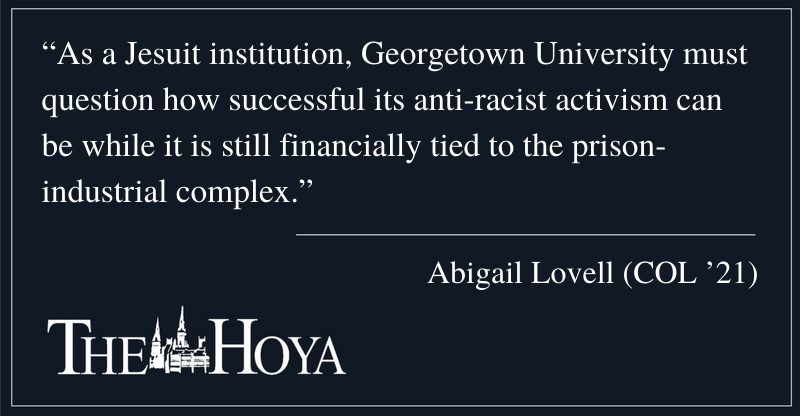Unequivocally, Georgetown University has recognized that it cannot remain complicit in oppressive systems. Since the African American studies department began in the early 2000s, the university has implemented academic, social and economic programs that begin to acknowledge and combat its history of enslavement, work toward its anti-racist responsibility as an educational institution and disentangle its finances from immoral industries. Nonetheless, Georgetown’s past actions are still insufficient. If Georgetown hopes to meaningfully combat racism, it must stop investing in racist systems, especially the prison-industrial complex.
On May 31, 2020, University President John J. DeGioia (CAS ’79, GRD ’95) addressed the student body to affirm the continuing need for institutionally led anti-racist work, writing, “We must determine how we contribute to perpetuating injustice and sustaining structures that cannot continue and that now must be reimagined. And, for us in our shared membership in this Georgetown University community, it remains for us in the Academy to contribute to this work of reimagining the social, political, economic and moral structures to ensure justice for all—and especially for those for whom it has been too long denied.”
The prison-industrial complex is simultaneously a structure that denies justice to all people, entagles our economy in immoral practices and disproportionately punishes BIPOC.
The prison-industrial complex is rooted in American slavery. Conversations surrounding it cannot be divorced from this essential fact. The 13th Amendment permits enslavement as a punishment for crime. With this caveat, the profit-hungry created an exploitative convict-lease system to sell convicts as laborers. To supply convicts, police arrested Black people for fabricated offenses and sold them to work for businesses, where they were frequently abused and worked to death. After convict-leasing fell out of favor, the United States again reimagined chattel slavery: In supervised chain-gangs, prisoners were forced to do manual labor while threatened with a whip’s end. Today, this system lives on through prison labor, in which jobs pay between 33 cents and $1.41 per hour on average, or nothing at all.
In 2017, Georgetown took an initial step to combat the prison-industrial complex by committing to not invest in private prisons. But private prisons are only the proverbial tip of the iceberg; they are a part of a mass of private companies that contract prison labor and contract with prisons to provide healthcare, food services, telecommunications and other essential services that keep both private and federal institutions afloat. If Georgetown truly intends to combat the injustices of the prison-industrial complex, it must also divest from those private companies that derive mutual benefit from relationships with carceral institutions.
As a Jesuit institution, Georgetown must question how successful its anti-racist activism can be while it is still financially tied to the prison-industrial complex. In his most famous sermon, Jesus preached that the position of a Christian’s heart is evidenced by that believer’s investments: “where your treasure is, there will your heart be also.” Indeed, our values and intentions are directly related to the way we spend our money. As a Catholic institution, it is hypocritical to invest in the prison-industrial complex.
Hoyas know firsthand how impactful Georgetown can be when it works towards social justice.
Graduate Mayze Teitler (COL ’18), now a second-year law student at Harvard, volunteered with professors Marc Howard and Joshua Miller, who taught Georgetown’s first cohort of incarcerated Hoyas, through the Prisons and Justice Initiative. She highlights the university’s preliminary efforts to combat racism, writing in an email, “When I was a student, the University divested from Private Prisons and finally recognized the violence that our alma mater committed by selling enslaved people to preserve its own existence. Georgetown took the first steps towards racial justice, pushing back against the evils of mass incarceration, recognizing its own complicity. But the journey cannot end there.”
In the same email, she then explained why the Georgetown University Prison Divestment Campaign’s divestment petition is essential.
“So long as the University profits from imprisonment, it does harm to the very people it claims to help,” she wrote. “To do right by our fellow Hoyas in the D.C. Jail, Georgetown should divest from prison labor. Divestment shows respect for the value of their work.”
Without question, it is time that Georgetown cuts its ties to the prison-industrial complex by committing itself to full divestment. For this reason, the Georgetown University Prison Divestment Campaign is presenting a petition to the Investment Office that demands the following: We call on Georgetown to compile a report on the progress of their 2017 private prisons divestment; divest from companies that use unpaid and/or cruel and exploitative prison labor in their supply chains; divest from companies with monopolies or business contracts that control prison necessities such as phone lines, food, health care and commissary items; require all future investments to be in companies that employ fair chance hiring practices; and advocate, through shareholder resolutions and other tactics, for policies within companies and within Georgetown itself that help reduce recidivism rates and create criminal justice reform such as fair chance hiring policies.
We are now collecting signatures from students, staff, faculty and graduates who support this essential cause. Please consider signing our petition and sending an email to the Office of the President demanding support.
It is time for Georgetown to put its money where its heart is.
Abigail Lovell is a senior in the College.














